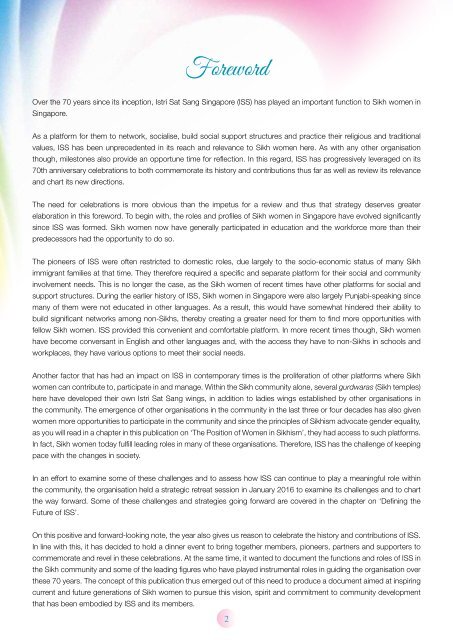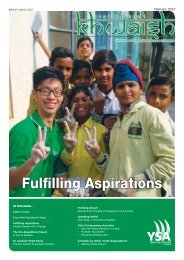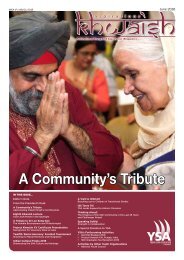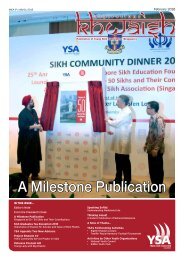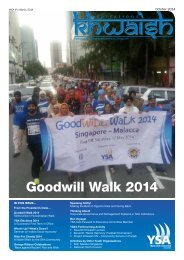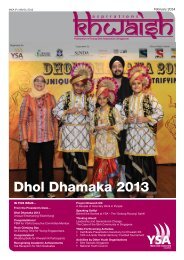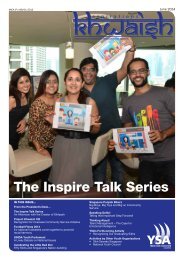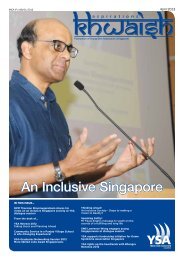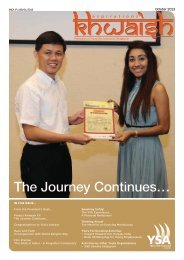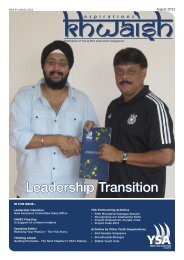ISS-Magazine_v7
Create successful ePaper yourself
Turn your PDF publications into a flip-book with our unique Google optimized e-Paper software.
Foreword<br />
Over the 70 years since its inception, Istri Sat Sang Singapore (<strong>ISS</strong>) has played an important function to Sikh women in<br />
Singapore.<br />
As a platform for them to network, socialise, build social support structures and practice their religious and traditional<br />
values, <strong>ISS</strong> has been unprecedented in its reach and relevance to Sikh women here. As with any other organisation<br />
though, milestones also provide an opportune time for reflection. In this regard, <strong>ISS</strong> has progressively leveraged on its<br />
70th anniversary celebrations to both commemorate its history and contributions thus far as well as review its relevance<br />
and chart its new directions.<br />
The need for celebrations is more obvious than the impetus for a review and thus that strategy deserves greater<br />
elaboration in this foreword. To begin with, the roles and profiles of Sikh women in Singapore have evolved significantly<br />
since <strong>ISS</strong> was formed. Sikh women now have generally participated in education and the workforce more than their<br />
predecessors had the opportunity to do so.<br />
The pioneers of <strong>ISS</strong> were often restricted to domestic roles, due largely to the socio-economic status of many Sikh<br />
immigrant families at that time. They therefore required a specific and separate platform for their social and community<br />
involvement needs. This is no longer the case, as the Sikh women of recent times have other platforms for social and<br />
support structures. During the earlier history of <strong>ISS</strong>, Sikh women in Singapore were also largely Punjabi-speaking since<br />
many of them were not educated in other languages. As a result, this would have somewhat hindered their ability to<br />
build significant networks among non-Sikhs, thereby creating a greater need for them to find more opportunities with<br />
fellow Sikh women. <strong>ISS</strong> provided this convenient and comfortable platform. In more recent times though, Sikh women<br />
have become conversant in English and other languages and, with the access they have to non-Sikhs in schools and<br />
workplaces, they have various options to meet their social needs.<br />
Another factor that has had an impact on <strong>ISS</strong> in contemporary times is the proliferation of other platforms where Sikh<br />
women can contribute to, participate in and manage. Within the Sikh community alone, several gurdwaras (Sikh temples)<br />
here have developed their own Istri Sat Sang wings, in addition to ladies wings established by other organisations in<br />
the community. The emergence of other organisations in the community in the last three or four decades has also given<br />
women more opportunities to participate in the community and since the principles of Sikhism advocate gender equality,<br />
as you will read in a chapter in this publication on ‘The Position of Women in Sikhism’, they had access to such platforms.<br />
In fact, Sikh women today fulfill leading roles in many of these organisations. Therefore, <strong>ISS</strong> has the challenge of keeping<br />
pace with the changes in society.<br />
In an effort to examine some of these challenges and to assess how <strong>ISS</strong> can continue to play a meaningful role within<br />
the community, the organisation held a strategic retreat session in January 2016 to examine its challenges and to chart<br />
the way forward. Some of these challenges and strategies going forward are covered in the chapter on ‘Defining the<br />
Future of <strong>ISS</strong>’.<br />
On this positive and forward-looking note, the year also gives us reason to celebrate the history and contributions of <strong>ISS</strong>.<br />
In line with this, it has decided to hold a dinner event to bring together members, pioneers, partners and supporters to<br />
commemorate and revel in these celebrations. At the same time, it wanted to document the functions and roles of <strong>ISS</strong> in<br />
the Sikh community and some of the leading figures who have played instrumental roles in guiding the organisation over<br />
these 70 years. The concept of this publication thus emerged out of this need to produce a document aimed at inspiring<br />
current and future generations of Sikh women to pursue this vision, spirit and commitment to community development<br />
that has been embodied by <strong>ISS</strong> and its members.<br />
2


